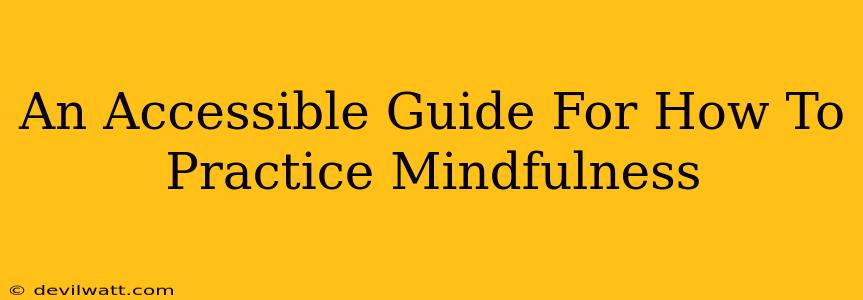Mindfulness. It's a word thrown around a lot these days, often associated with serene images of meditating monks or expensive retreats. But the truth is, mindfulness is far more accessible than you might think. It's a simple yet powerful practice that can significantly improve your mental and emotional well-being, regardless of your background or experience. This guide will provide you with practical, easy-to-follow steps to incorporate mindfulness into your daily life.
What is Mindfulness?
Before diving into the how-to, let's clarify what mindfulness actually is. It's not about emptying your mind or achieving some mystical state. Instead, it's about paying attention to the present moment without judgment. This means noticing your thoughts, feelings, and sensations as they arise, without getting carried away by them. It's about observing your experience with curiosity and acceptance.
Simple Mindfulness Practices for Beginners:
Even a few minutes a day can make a difference. Here are some easy-to-implement practices:
1. Mindful Breathing:
This is the cornerstone of many mindfulness practices. It's incredibly simple, yet profoundly effective.
- Find a comfortable position: Sit or lie down, ensuring your spine is straight but not rigid.
- Focus on your breath: Pay attention to the sensation of the air entering and leaving your nostrils, or the rise and fall of your abdomen.
- Acknowledge distractions: Your mind will wander – that's perfectly normal! Gently guide your attention back to your breath whenever you notice it drifting.
- Start small: Begin with just 5 minutes a day, gradually increasing the duration as you feel comfortable.
2. Body Scan Meditation:
This practice helps you connect with your physical sensations.
- Lie down comfortably: Close your eyes and bring your attention to your body.
- Scan your body systematically: Starting with your toes, slowly move your attention upwards, noticing any sensations – tingling, warmth, tension, or even numbness – without judgment.
- Acknowledge sensations: Simply observe what you feel; don't try to change anything.
- Embrace the present moment: Allow yourself to fully experience the sensations in your body.
3. Mindful Walking:
Turn your everyday walks into mindfulness exercises.
- Pay attention to your feet: Notice the sensation of your feet making contact with the ground.
- Observe your surroundings: Take in the sights, sounds, and smells around you without judgment.
- Focus on your breath: Continue to be aware of your breath as you walk.
- Let go of thoughts: When thoughts arise, simply acknowledge them and gently return your attention to your feet and breath.
4. Mindful Eating:
Transform your mealtimes into moments of mindful awareness.
- Choose a single item of food: Focus on one piece of fruit, a bite of your meal, etc.
- Engage all your senses: Notice the color, texture, smell, and taste.
- Savor each bite: Chew slowly and mindfully, paying attention to the sensations in your mouth.
- Avoid distractions: Put down your phone and focus solely on your food.
Incorporating Mindfulness into Daily Life:
Mindfulness isn't just about dedicated meditation sessions; it's about cultivating a mindful awareness throughout your day. Here are some tips:
- Practice mindful listening: Really listen to what others are saying without interrupting or formulating your response.
- Engage in activities fully: Whether washing dishes or taking a shower, immerse yourself in the present moment.
- Practice gratitude: Regularly take time to appreciate the good things in your life.
- Be patient and kind to yourself: Mindfulness is a journey, not a destination. There will be times when your mind wanders – that's okay.
The Benefits of a Mindful Life:
The benefits of practicing mindfulness are numerous and well-documented. It can help to:
- Reduce stress and anxiety: By anchoring you in the present, mindfulness helps to lessen the grip of worry about the future or regret over the past.
- Improve focus and concentration: Regular mindfulness practice strengthens your ability to stay present and focused.
- Increase self-awareness: Mindfulness allows you to become more aware of your thoughts, feelings, and behaviors.
- Boost emotional regulation: By observing your emotions without judgment, you can develop greater control over your emotional responses.
By incorporating these simple techniques into your daily routine, you can begin to experience the many benefits of a more mindful life. Remember, consistency is key. Start small, be patient with yourself, and enjoy the journey!

